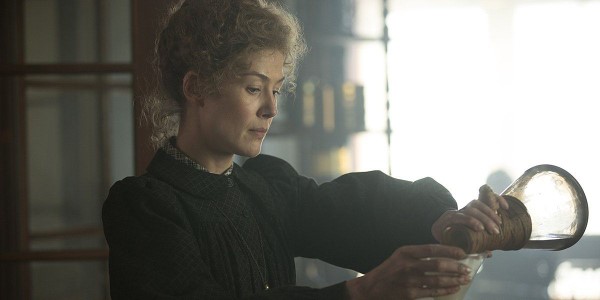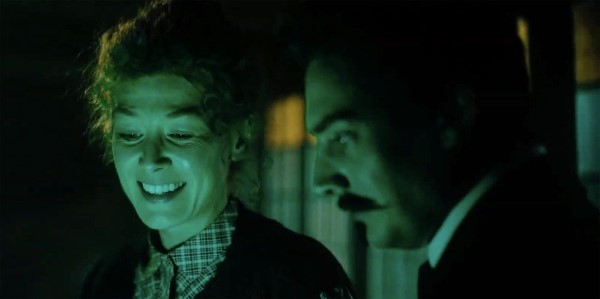
Radioactive is a biopic of one of the greatest geniuses of the 20th century, Marie Curie. Not only did she break gender barriers by being the first woman to win a Nobel Prize (and the first person to join the very elite group of two-time winners), but her discoveries of the radioactive elements radium and polonium also broke scientific barriers and ushered the planet into the nuclear age.
If the previous paragraph represents the limits of your knowledge on the fascinating character that is Madame Curie, consider yourself in good company. The film attempts to fill in the gaps between the most commonly known facts about Marie Curie but, in typical biopic fashion, does so in the form of a capital “P” Performance from its lead. As is often the case for films of this ilk, there are undoubtedly already articles circulating with headlines reading “how Rosamund Pike became Madame Curie for her latest film” and so on. To that, I’d answer simply, she acted.
She acts steadfast and obstinate against the all-male science ministry which refuses to respect her lab space in the first act. She acts focused but softens as she falls in love with Pierre Curie (Sam Riley), the one scientist who appreciates her for her intelligence, in the second act. She acts heartbroken, she acts resolved, she acts despondent and she acts bold, all in the course of under two hours because this is a movie that is trying to adapt a novel that is trying to capture a life, and that doesn’t even cover the flash-forwards to non-narrative scenes showing the lasting (and mostly harmful) effects of her work on a global stage.

It is unfortunately to the film’s detriment that it tries to put Curie’s intimate personal struggles in the greater context of her work’s legacy, which would remain largely unknown to her even upon her death, rather than focus solely on her unique life, remarkable in itself. If there’s one thing the audience doesn’t need to be shown (three times, no less), it’s her explosive legacy.
Stylistically speaking, for a subject that could have thrived as a television mini-series, it ironically resembles a cheaply made TV show. Radioactive is awash with neons, haloed overexposures, Instagram-filter tinting and candy-bright color saturation. I can almost guarantee it’s because director Marjane Satrapi (Persepolis, The Voices) wanted to make the film “glow.” But instead of an inspired visual theme, it comes across as overused and heavy-handed. This is a shame, because it occasionally works, especially when backed by a score that incorporates synth arpeggiation into its classical instrumentation.
Ultimately though, while Radioactive has all the elements of an interesting and engrossing story, they—like Curie’s discoveries—were sadly misused. Radioactive is currently available to stream on Amazon Prime.













